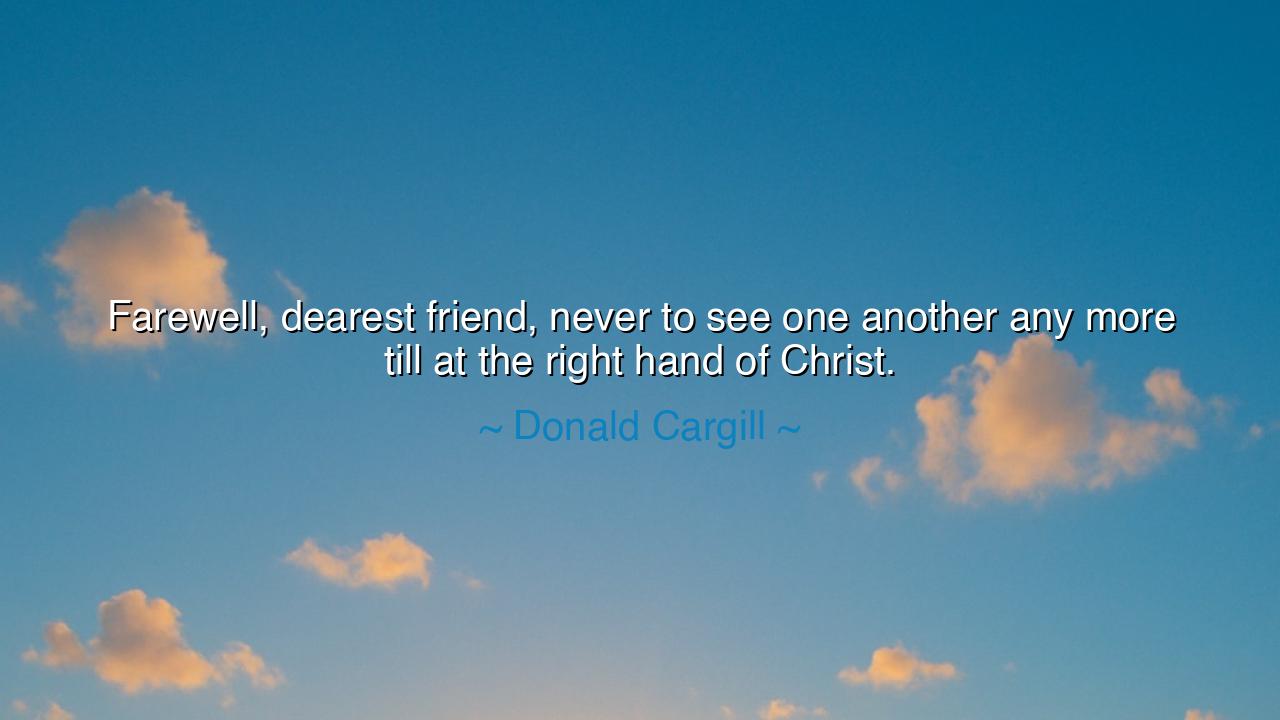
Farewell, dearest friend, never to see one another any more till
Farewell, dearest friend, never to see one another any more till at the right hand of Christ.






Hear the final and trembling words of Donald Cargill, Covenanter and martyr of Scotland, who declared to his companion: “Farewell, dearest friend, never to see one another any more till at the right hand of Christ.” These words, spoken at the threshold of death, echo with the strength of faith and the sorrow of parting. They are not the cold farewell of indifference, but the burning declaration of one who looks beyond earthly separation to the eternal reunion promised in heaven.
The meaning of this saying rests in the union of two great forces: grief and hope. For in parting from a beloved companion, Cargill admits the pain of never again beholding their face in this life. Yet he tempers that grief with a vision of glory—that though divided now by the sword of mortality, they shall stand again together in eternity, at the side of Christ, where no persecution or death can divide them. This balance of sorrow and hope is the essence of the martyr’s faith: to suffer separation here, yet believe in reunion hereafter.
The origin of these words is found in the fires of 17th-century Scotland, when the Covenanters resisted the rule of kings who sought to impose control over their church. Cargill, a preacher and leader, defied the crown, declaring Christ alone as head of the Church. For this defiance he was condemned to die. As he prepared to meet his fate, he turned to his friend, offering not despair but the assurance that their bond was not broken, only delayed until eternity. Thus his farewell was both a blessing and a testimony of unshaken faith.
History offers other mirrors of this spirit. When Socrates was condemned to drink the hemlock, he comforted his friends not with fear, but with the hope that death would either be a dreamless sleep or a passage to another realm where he might speak with heroes of old. His words, like Cargill’s, sought to turn grief into courage, showing that parting in this world is not the end of fellowship. For those who believe in something beyond, death is a doorway, not a prison.
The emotional force of Cargill’s farewell lies in the tenderness of friendship joined with the majesty of faith. To call one “dearest friend” at the hour of death is to recognize that human love is a gift from God, not to be despised even when eternity is in view. And yet, by placing the reunion “at the right hand of Christ,” Cargill shows that friendship itself is sanctified, lifted into eternity, and preserved by the power of the divine. This is the heroic blend of human affection and divine assurance.
The lesson for us is clear: cherish your friends deeply, and when parting comes—whether by distance, conflict, or death—do not let grief consume you. Instead, temper it with hope. If you are of faith, hold fast to the vision of reunion in eternity. If not, remember that the memory of love, the legacy of kindness, and the strength of shared moments live on, shaping generations yet to come. To say farewell need not mean forever; it can mean, “until we meet again, in some brighter place.”
So, children of tomorrow, carry this wisdom into your own lives: do not fear partings, though they pierce the heart. Bind your friendships with sincerity, let them be true and holy, and when the time comes to say goodbye, speak as Donald Cargill did—with sorrow, yes, but also with unyielding hope. For whether at the right hand of Christ, or in the immortal memory of love itself, bonds of the soul are never wholly broken. And in this truth, partings lose their sting, and farewells become promises.






AAdministratorAdministrator
Welcome, honored guests. Please leave a comment, we will respond soon